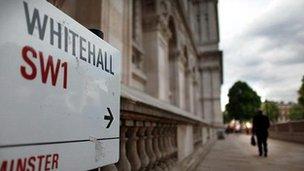Francis Maude urges policymakers to be 'grown up' over FOI transparency
- Published

Whitehall figures say FOI requests could force discussions into the shadows
Policymakers should have a more "grown up" attitude to transparency and not worry about causing "embarrassment", Francis Maude has told MPs.
The Cabinet Office minister was facing questions from MPs on the future of freedom of information laws.
Lib Dem justice minister Lord McNally also warned against watering down legislation as some ex-ministers want.
The information watchdog hit out at the government this week for blocking the publication of an NHS risk assessment.
Ministers were appearing before the Justice Select Committee amid growing claims the Freedom of Information Act could be downgraded.
'Candid advice'
Appearing before the committee, Attorney General Dominic Grieve said there were "really compelling and good arguments" for keeping cabinet papers secret.
It is a healthy part of the policy making process that ministers can argue in private but present a united front in public, he insisted.
Former head of the civil service Lord O'Donnell has said the fear of cabinet minutes being released mean policy discussions go into an "unrecorded space" - leading to "wrong policy".
Mr Maude echoed this criticism to the committee, saying freedom of information requests had the effect of pushing discussions to "the tearoom, and not in cabinet where they should be".
But the Conservative minister said he thought the act was a "good idea" and insisted the government had "aggressively" pursued a transparency agenda.
"We now publish more data than any other government in the world and are regarded at the leading edge here," he said.
Labour's Jack Straw - who helped draft the Freedom of Information Act - has said it should be re-written to create a protected space for cabinet ministers and officials to discuss policy.
And Mr Maude told the committee the "essence of being effective in government" was being able to receive "brutal" and "candid" advice from officials.
"Is this happening to the same extent now as when I was around 20 years ago? It's really hard to measure but my feeling is it is less so because of exactly this concern," he told MPs.
But he said that, on balance, that it was worth preserving: "Can it lead to embarrassment? Yes. Do we have to be a bit grown up about that? Yes, we do."
Risk register
Warning against changes to the act, Justice minister Lord McNally said he wasn't opposed to "tweaking it" but he questioned whether "we want to send out the message that we are going to start lowering the portcullis of secrecy again".
He said the public are already convinced journalists, the police and politicians have something to hide - a reference to to the ongoing Leveson inquiry.
The Lib Dem peer appeared to criticise the coalition cabinet's decision to <link> <caption>veto orders from the Information Commissioner</caption> <url href="http://www.bbc.co.uk/news/health-18071681" platform="highweb"/> </link> to release a document setting out the potential consequences of their NHS overhaul.
He said when his department had published a risk assessment, "the opposition, during debate, threw that assessment at us and we had to say 'yes' because if you're making policy you've got to look at what are going to be the benefits of making policy and what are going to be the dangers.
"The idea of not having that discussion I don't think helps for good government," he added.
But while Mr Grieve - the government's chief legal adviser - would not be drawn on the controversial move to block release of the NHS transition risk register, he doubted whether the case was part of moves to change freedom of information policy.
"I've heard nothing to suggest to me that there is some policy decision of 'let us establish clear boundaries so as to provide us with safe space'."
And he said the decision to keep the risk register from the public was "compatible" with both the Freedom of Information Act and government guidelines.
"I don't think it can be said that what has been done in this particular case is so unusual - and so outside what the government has indicated it would do - that it's in some way an extraordinary decision," he added.
He said the Information Commissioner could challenge the the decision if he thought it was flawed.
- Published15 May 2012
- Published15 May 2012
- Published17 April 2012